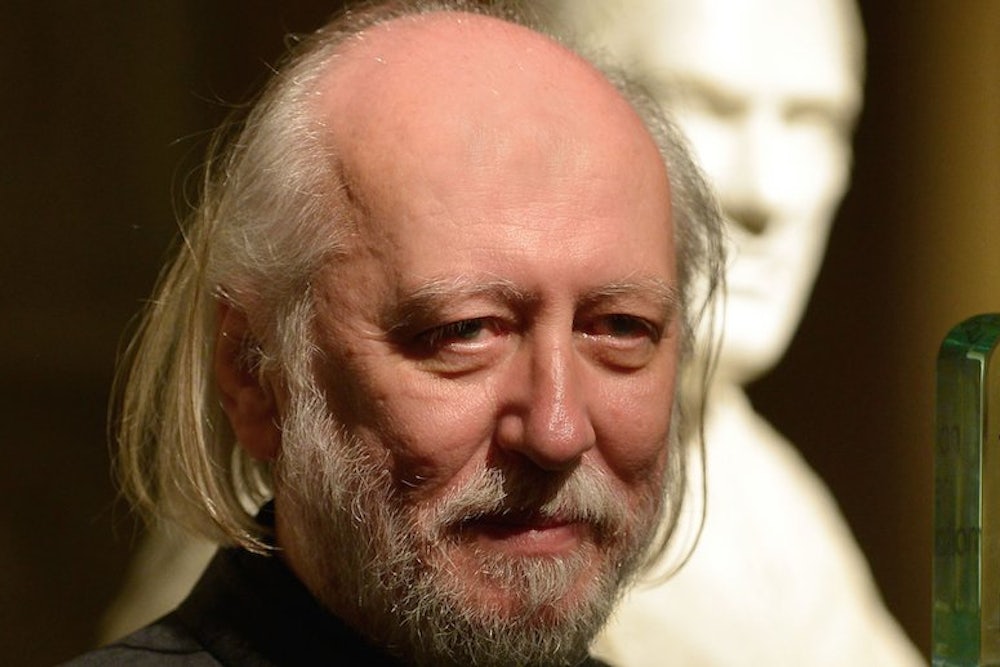When Hungarian novelist László Krasznahorkai was announced as the winner of the 2015 Man Booker International, a wave of disappointment could be seen rippling across Twitter, where many of us had been pulling for a non-Anglo, non-European winner.
Finally this year, things looked good for literature’s Africanists, internationalists, and assorted boundary crossers. Novelist and academic Marina Warner, chair of the 2015 judges, has a particular interest in Arabic literature. She chose Arabist and comparativist Wen-chin Ouyang as one of the year’s judges, alongside British Pakistani novelist Nadeem Aslam, poet and publisher Edwin Frank, and Oxford University’s Elleke Boehmer, whose scholarly interests cohere around anti-colonialism.
Indeed, Warner said she was consciously attempting to shift the prize’s focus, which has previously reflected English literature’s inward gaze. “I was asked to be the chair,” she said in an April interview, “and the chair’s job is to choose the judges. I chose them—and I was very lucky that they agreed to do it—because they have an interest beyond the Anglo-American metropoles.”
The five judges did their job: The finalists’ list, announced in March, surprised seasoned Man Booker International watchers. An unprecedented four writers, from a longlist of ten, hail from African nations. One writer, Maryse Condé, is from a small Caribbean country that “never makes headlines unless there is a hurricane or an earthquake,” the author told The Guardian in a pre-award interview. Finalist Amitav Ghosh is from India, César Aira from Argentina. Only a single North American writer, Fanny Howe, made the finalists’ list, and there were none—zero—from the U.K. or Ireland.
The list stoked the imaginations of readers and writers who have long been considered marginal by Anglophone literary gatekeepers. In the same April interview, Warner said that she didn’t see it as “a question of changing the vantage point to another vantage point. It’s actually accepting a model of the world that is very internet-like, in the sense that it’s flat and networked, rather than radiating from New York or London.”
Whether or not Warner’s vision reflects publishing reality, this picture of world literary transmission has tremendous appeal. And despite the resounding “meh” from the cheap seats over this major, £60,000 prize going to a European writer, when we pick up the pieces, the year can still be counted as a win for champions of a more global literary outlook.
After all, the 2015 finalists’ list signified a major shift for the biannual prize, and the shift may well be reflected elsewhere.
The five previous finalists' lists have looked like much of Anglophone literature. They leaned heavily on writers working in English, particularly those who live in the U.S. or U.K. In 2007, eleven of the 15 finalists wrote in English. Among these were three Canadians, three U.K. writers, two from the U.S., and one from Ireland. The prize requires that a significant body of the author’s work be written in or translated into English. Nonetheless, it’s not supposed to be an English-focused prize.
Still, until this year, only one of the winners wrote in a language other than English: Albanian novelist Ismail Kadare, who took the debut prize in 2005. The other winners were Nigerian author Chinua Achebe (2007), Canadian Alice Munro (2009), and two from the U.S.: Philip Roth (2011) and Lydia Davis (2013).
Non-European languages have been poorly represented. Of the five previous times the prize was given, only one Arabophone author made the finalists’ list, and that was Naguib Mahfouz, who had already taken the Nobel Prize for Literature. Only two non-Anglophone Indian authors have made the lists: Mahasweta Devi and U. R. Ananthamurthy. There has been just one Japanese author, Kenzaburo Oe, who also had taken the Nobel, more than a decade before.
This problem is not exclusive to the Man Booker International. English-language awards that promise to be “international” have a way of acting very provincial. The International IMPAC Dublin Literary Award, which longlists nearly 150 books from around the world, leans heavily on English-language and European writers. Although the prize gathers its hundred-plus nominations from libraries around the world, this year, it had as many nominators from Liechtenstein as it did from all of Africa. (One.)
While this year’s Man Booker International still lands with a European winner, it does foreground the overlooked work of translators. Krasznahorkai was acclaimed by the judges for paragraphs “that are as monumental as they are scabrous and musical.” This achievement points to the work of two translators, George Szirtes and Ottilie Mulzet, who will share the £15,000 “translator’s prize” that accompanies the main award.
In English, Krasznahorkai is published by New Directions Press, and the house shares in their author’s win. “It’s very significant that actually most of our writers on the list, and many of the writers whom we read for the prize, are published by small publishers,” Warner said. “It’s the small presses that are reading widely and finding interesting voices. The voices of our time.”
English translation still has many blind spots. Especially glaring is the lack of anything from non-Anglophone Indian literatures. Translations, particularly from non-European languages, are too often done because of what Iraqi novelist Sinan Antoon calls “forensic interest.” The director of Literature Across Frontiers, Alexandra Büchler, recently said that, directly after the earthquakes that ravaged Nepal, she received sudden and unexpected interest in Nepali literature.
The 2015 Man Booker International, on the other hand, celebrates literature not for its “newsy” appeal, but for being great literature. This year, it earns the final third of its moniker.
